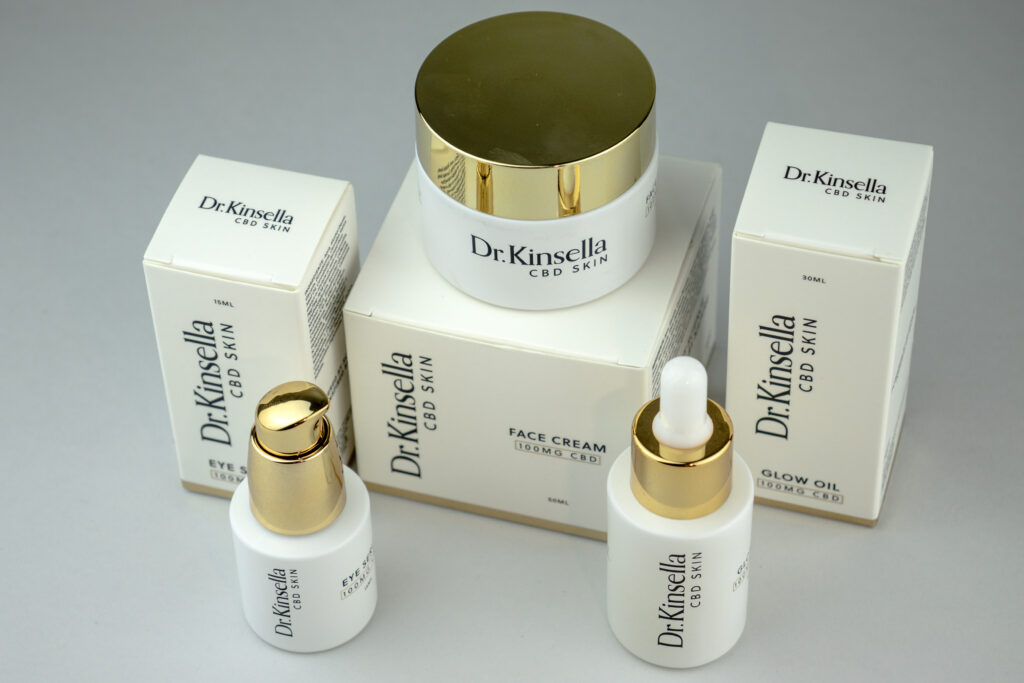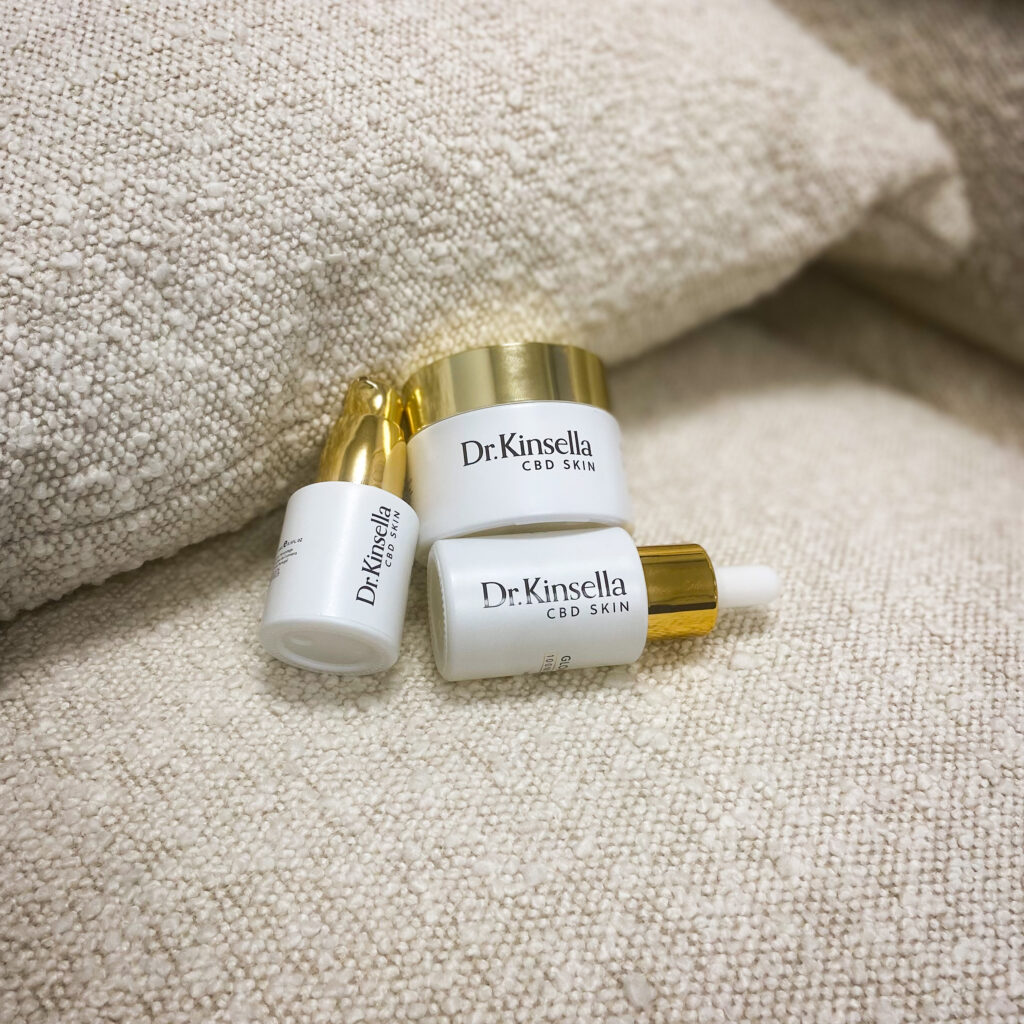GLOW OIL
FACE CREAM
EYE SERUM
Top Reasons To Include Allantoin In Your Skincare Routine
Key points
- Allantoin is a moisturising and exfoliating ingredient used in a variety of skincare products. This ingredient can be produced synthetically, but it’s also found in some plants such as comfrey, chamomile, beets, and wheat sprouts.
- Allantoin has many health benefits, and it’s a very multifunctional ingredient. It helps to hydrate the skin, reduce itchiness, heal minor injuries, and improve the overall texture and appearance of the skin. Allantoin’s soothing properties are especially beneficial for dry skin.
- This ingredient is safe to use on all skin types, including sensitive skin.
- Allantoin can be found in different moisturisers, creams, and toners. It’s also present in many scar gels because it is believed to help with skin healing. Plus, it’s very effective in anti-ageing products, which is why we’ve included this ingredient in our Dr. Kinsella premium face cream.
Allantoin, also known as aluminium dihydroxy allantoinate, is a chemical compound naturally found in the human body. It’s often derived from the comfrey plant, but it can also be extracted from beets, chamomile, wheat sprouts, and tobacco seeds. Allantoin used in skincare products is most often made synthetically to ensure a high level of purity.
Allantoin is a common skincare ingredient found in all types of products, including creams, shampoos, and lotions. However, this chemical is not very well-known among customers, and it definitely deserves more recognition. In this article, we’ll talk about allantoin’s benefits for skin and explain why you should include products with allantoin in your skincare routine.

Allantoin Benefits For Skin
Humans have used comfrey leaves to heal minor skin injuries and alleviate swelling for many years. We now know that this plant is very rich in allantoin, which lends it its healing properties. And even though today, this miraculous chemical is usually synthetically created in a lab, it is still very popular for its soothing and healing properties.
Allantoin powder is added to many skincare products, including moisturisers, exfoliators, and masks. This ingredient also has a lot of other properties our skin can benefit from, in addition to its healing capabilities. Here are some of the main benefits allantoin can have on your skin:
Moisturising
One of the main reasons why people search for skincare products containing allantoin is this ingredient’s moisturising properties. It effectively decreases transepidermal water loss (TEWL) in the dermis, making the skin look more youthful and plump. Essentially, this chemical works like a sponge and helps your skin to retain moisture.
Thus, products that contain allantoin usually work incredibly well at keeping the skin hydrated and alleviating irritation. Additionally, this ingredient has keratolytic properties, which can also help with skin hydration.
Healing
As mentioned above, plants containing allantoin were first used by ancient humans to promote skin healing. And today, this ingredient is added to creams and lotions to soothe injured skin and facilitate wound healing. Dermatologists often recommend allantoin for treating skin irritation and rashes. It can also alleviate inflammation and help get rid of minor scars by increasing the blood flow and stimulating collagen production.
Soothing
Allantoin also works as a calming agent. It can soothe the skin, alleviate irritation, reduce redness, and minimise swelling, creating a more even skin tone.
Exfoliating
Because of its keratolytic properties, allantoin helps exfoliate the skin and remove dead skin cells from the outer layer of the skin. Increased cell turnover helps your epidermis become smooth and lends it a natural glow. Unlike physical exfoliators, which can easily cause damage, allantoin is very gentle on the skin, making it a perfect choice for those who have sensitive skin. Because of the ingredient’s exfoliating properties, products that contain allantoin may also brighten the skin tone.
Anti-Ageing
As we age, collagen production in our bodies slows down, which causes the skin to lose its elasticity. The less elastic our skin is, the more visible ageing signs like fine lines and wrinkles become. While we can’t reverse collagen loss completely, we can definitely slow down the process of skin ageing by using products with allantoin. This ingredient boosts collagen formation by stimulating fibroblasts, cells that produce this protein. Allantoin also promotes extracellular matrix synthesis, which creates a younger appearance.
In addition, this miraculous chemical increases cell proliferation and helps to “remodel” the cells. This happens because of allantoin’s exfoliating properties. When dead cells are removed from the surface of the skin, it stimulates more active production of new cells. Unfortunately, as we age, the cell turnover process in our bodies slows down, which results in dry and dull skin. That’s why including “exfoliating boosters” like allantoin in your skincare routine helps to minimise the ageing signs.
Eliminating Acne
Allantoin is sometimes included in anti-acne products as an ingredient that prevents breakouts caused by bacteria. While there’s little research available to prove this yet, allantoin may indeed help to control acne.
Hydration is key to healthy skin, especially if you’re prone to breakouts. Acne causes dry skin, which results in the body producing more oil to moisturise it, which then leads to clogged pores. Clogged pores create an even better environment for bacteria growth, and you end up with a vicious cycle. Luckily, allantoin may help eliminate acne and prevent it from reoccurring, as it attracts moisture to the skin, soothing and hydrating the affected areas.
Treating Sensitive Skin
People with sensitive skin often have a hard time finding products that work for them. Luckily, allantoin doesn’t cause irritation, burning sensations, or redness. On the contrary, this ingredient alleviates irritation and soothes sensitive skin.
Side Effects of Allantoin
Allantoin is overall very safe to use, and as of now, no side effects have been detected. It is gentle on the skin and doesn’t irritate it. Allantoin is suitable for all skin types, including sensitive, and it’s also a great choice for people with different unpleasant skin conditions. This ingredient is also not known to cause allergic reactions.
Allantoin is often combined with silicone and other emollients to create a potent formula. You can easily find combinations of these ingredients in scar creams and high-quality skincare products like Dr. Kinsella premium face cream.
The ingredient also works well with retinol, which is an anti-ageing remedy. However, it’s recommended not to combine allantoin with exfoliants like alpha and beta hydroxy acids because it might result in allergic reactions or skin irritation.

How to Use Allantoin For Skin
Allantoin is available in different forms, including powder, gels, creams, moisturisers, masks, serums, and toners. No matter which option you choose, you should always follow specific instructions stated on the product’s label.
If you use exfoliating products with allantoin, it’s better not to apply them too often because over-peeling the skin can result in irritation and dryness. Doctors generally recommend using exfoliating products about once a week or so.
Allantoin can also be found in sunscreens since it helps to protect the skin from UV lights. Some sunscreens may trigger allergies, so if you have sensitive skin, opt for products that contain allantoin to counter the irritating effect of the product’s formula.
Face creams with allantoin can be used every day and even twice a day so that you can enjoy the benefits of this ingredient at every moment.
Face Cream by Dr. Kinsella
Dr. Kinsella anti-ageing cream works wonders in moisturising and nourishing the skin. The powerful combination of allantoin with vital antioxidants such as vitamin C helps to conceal the signs of ageing and slow down cell degeneration. Our face cream is a premium-quality skincare product with a unique formula that provides a prolonged effect, unlike many other anti-ageing products. Try it today and enjoy seeing gorgeous, healthy skin every time you look in a mirror.
FAQs
Is allantoin anti-ageing?
Yes, allantoin is an effective ingredient in anti-ageing treatment. Allantoin has moisturising, soothing, and skin-healing properties, all of which contribute to its anti-ageing benefits. Premium face cream by Dr. Kinsella combines allantoin with other potent anti-ageing ingredients to create a powerful and luxurious product that helps your skin stay youthful.
Is allantoin a moisturiser?
Yes, allantoin is one of the most effective moisturising ingredients in skincare. It doesn’t irritate the skin and can be used even on sensitive skin. Allantoin helps the skin to retain moisture, making it look more plump and youthful.
Does allantoin help acne?
Yes, there’s evidence that allantoin may help with acne. Acne is often caused by skin dryness and irritation, and allantoin helps the skin to retain moisture, which prevents it from becoming dry and dehydrated. Allantoin also works very well for alleviating irritation and redness.
Is allantoin good for scars?
Yes, allantoin is excellent for healing scars. It heals the skin by promoting blood circulation and boosting collagen production. Allantoin effectively hydrates the skin and helps smooth out its surface, which reduces the appearance of scars.
Can allantoin be used daily?
Most products that contain allantoin can be used twice a day. These products include moisturisers, lotions, and scar gels. If you’re using an exfoliator with allantoin, it’s recommended to limit the use to once per week. Always double-check the labels for specific instructions regarding the product you’re using.
